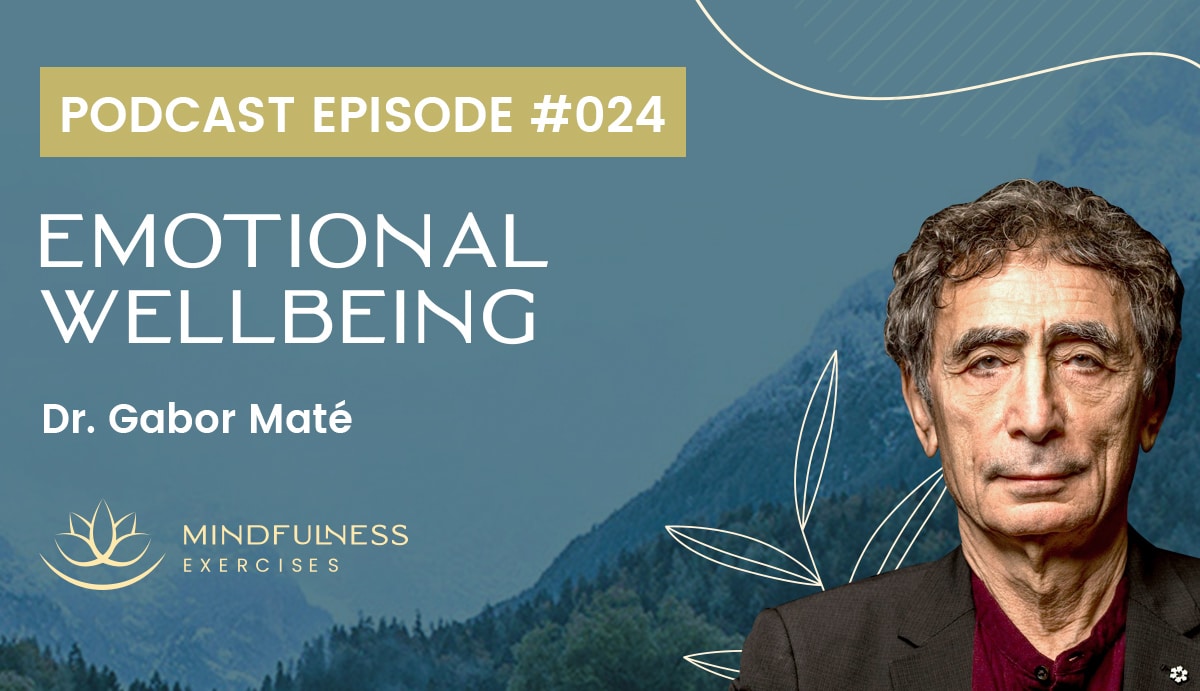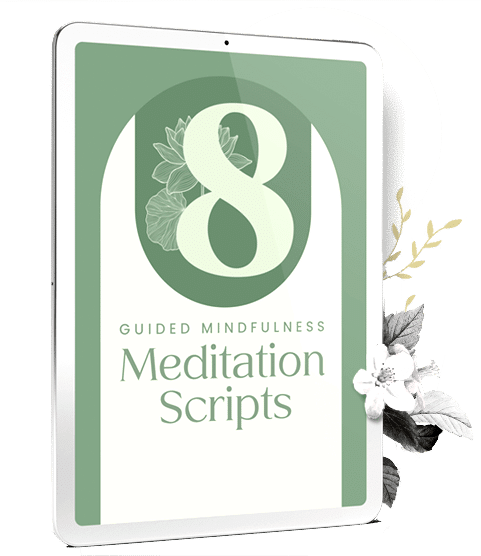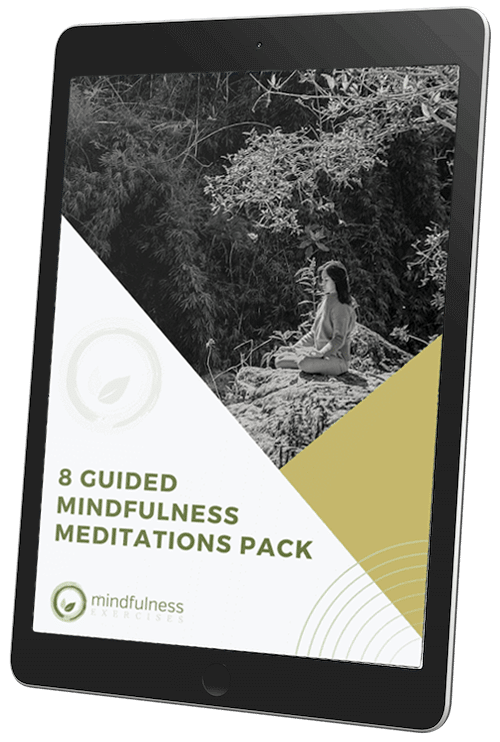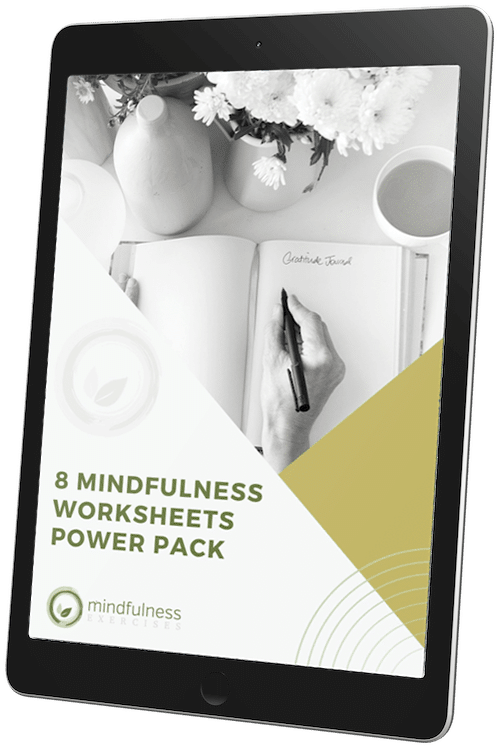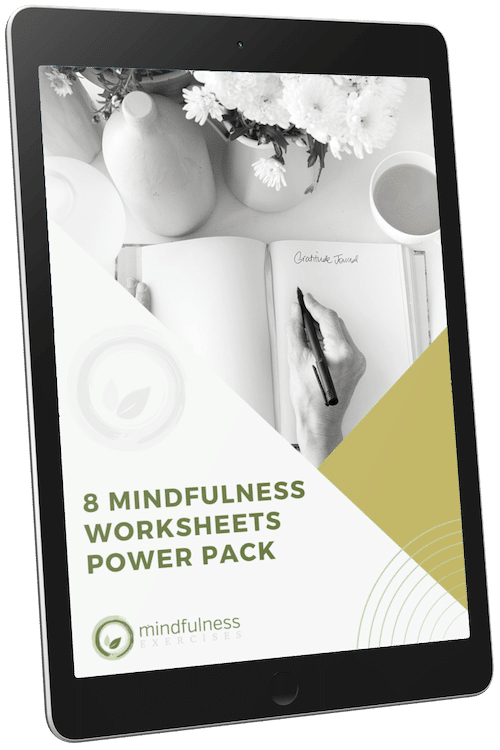
Whether it’s facing the grief from an unexpected loss, anger at the painful words of someone close to us, or the resentment of not asking for what we need, we all experience difficult emotions. Each of these moments impacts us on an emotional, mental, and physical level.
When we don’t process the emotions that arise during these challenging times – such as anger, rage, grief, panic, or guilt – they can shape our perceptions and behaviors for years or decades to come. Something might trigger an old unconscious memory, carrying with it an emotion that makes us uncomfortable, stressed, anxious, or upset. Without cultivating mindful awareness, being with such emotions can leave us feeling overwhelmed or powerless.
So is it possible to learn to meet our emotions with compassion rather than turning away from them so we don’t create more unnecessary pain for ourselves?
World-renowned psychologist, Dr. Gabor Maté, suggests that the path to healthy emotional well-being begins with mindfulness and healing our relationships. Here, we offer key takeaways from a recent Mindfulness Exercises podcast episode where Sean Fargo chats with Dr. Gabor Maté to bring insights into healthy ways to address the range of difficult emotions that naturally come with being human.
Learn how Dr. Gabor Maté suggests handling difficult emotions in this episode of the Mindfulness Exercises podcast: Dr. Gabor Maté on Emotional Wellbeing, with Sean Fargo
How do emotions impact your well-being?
Every emotion you feel plays an important role in keeping you healthy. This includes the emotions that may be hard to feel or express such as anger, fear, shame, or guilt. Contrary to what many of us have been taught, these emotions weren’t meant to be repressed or pushed away. Rather, they can become a gift to ensure that your needs are met so you can truly enjoy each precious moment more fully.
Dr. Gabor Maté likens your emotions to a gatekeeper that functions like your body’s immune system. On the physical level, the immune system is designed to let in what’s nourishing and keep out what isn’t. On the mental level, your emotions let you know what helps you thrive and what may be toxic to your well-being.
Take the emotion of anger, for example. Anger has an important role in helping you set and enforce healthy boundaries. When someone is hurting your feelings, it’s only natural that you don’t want to be exposed to their intrusive attacks. So anger lets you know that it’s time to take action and stand up for what you want or need from the situation.
Just as you wouldn’t tolerate someone hurting you physically, anger is the first indicator that something may need to be done to stop another person from further hurting you emotionally. This is crucial to caring for your well-being so you can feel safe going through life without closing off your heart.
“Intuitively we all know that it’s better to feel than not to feel. Beyond their energizing subjective change, emotions have crucial survival value. They orient us, interpret the world for us and offer us vital information. They tell us what is dangerous and what is benign, what threatens our existence and what will nurture our growth.”
- Gabor Maté -
Anger, rage, panic: to keep it in or let it out?
Throughout his decades of research, Dr. Gabor Maté has found that rage, panic, and grief are among the most suppressed emotions. Yet this suppression weakens the immune system and can lead to a range of physical illnesses.
Rage and anger are part of our mammalian brain and system for a reason. They signal us to protect ourselves from those who threaten us so we can continue to survive as a species. So why does it feel so much easier to suppress these feelings than to express them?
When we feel emotions like anger, rage, panic, or grief, there’s an innate fear that expressing them could threaten a relationship. And as human beings wired for social connection, the last thing we want is to alienate someone.
Unconsciously, we often do whatever we can to appear to others in the best image possible – even if this means foregoing our own needs and desires. This can easily turn into lifetime habits of people-pleasing, unhealthy behaviors, and addictions.
The good news is that emotions like anger, rage, panic, and grief can be addressed in a way that allows us to expand our self-awareness without suppressing them. And mindfulness is a great place to start.
Turning toward difficult emotions with mindfulness
When you practice mindfulness, you become more familiar with the landscape of your inner self. The thoughts, feelings, and beliefs that may once have been unconscious start rising to your awareness. By noting their presence without judgment, you build the ability to be with what is, even when it feels difficult.
Practice what it’s like to be fully present with your emotions (without overwhelm or judgement) with our free mindfulness of emotions worksheets, guidebooks, and meditation scripts.
Every emotion has a physical sensation associated with it. Some emotions may feel hot or bring a tightness to your chest while others generate a sense of unease in your belly. Mindfulness practices like the body scan allow you to notice the sensations that arise in the body so you can feel safe witnessing their presence.
Through mindfulness, you may discover that while you notice anger or rage, you are not the anger or rage itself. You are the awareness that is doing the noticing. Rather than ignoring such difficult emotions, mindfulness allows you to bring a tender and loving awareness to them. This opens up a space where you can be with them more fully.
Try this 9-minute guided mindfulness meditation to explore being with difficult feelings with kind and gentle curiosity: Exploring the feeling tones in the body guided meditation.
Overwhelmed with emotions? Try compassionate inquiry
As you practice mindfulness of emotions, it’s normal to initially feel a sense of overwhelm. When you feel this or have an urge to move away from your emotions, compassionate inquiry can help. It moves you closer to the heart of what may be causing certain reactions or feelings to surface.
Developed by Dr. Gabor Maté to help people feel greater emotional freedom, compassionate inquiry allows you to look at what you’re feeling and become curious as to why you’re feeling that way. This practice deepens your level of self-awareness and can help you cultivate more self-compassion.
To practice compassionate inquiry, first acknowledge the emotion that is arising. Is it anger, rage, frustration, shame, guilt, blame, grief or something else? Then, do an inquiry on this emotion. Ask yourself questions such as:
Be with your answers without judging or analyzing them. Simply notice what comes up. Recognize that you are not the feelings that are causing you pain. You are the one who is uncovering them. This practice builds your muscle of awareness so that you can be present with what arises (within and outside yourself) without getting too overwhelmed or caught up by it.
The more often you do the compassionate inquiry, the more mindful you become. The more mindful you become, the more you’ll be able to notice anger (or another difficult emotion) arising without acting on it or without feeling powerless over it.

How to be kinder to yourself amidst difficult emotions
In a culture that often touts positivity, it can feel as if we shouldn’t be having negative emotions. Yet this idea itself then causes us to judge ourselves for feeling our emotions and may lead to spiritual bypassing. So how do you get out of the loop of judging yourself for emotions like anger, rage, grief, or panic so you can feel them and work through them in a healthy way?
First, Dr. Gabor Maté suggests recognizing that judgment is an automatic process. We don’t consciously decide to judge ourselves…yet we then judge ourselves for judging ourselves.
As you notice self-judgments arising, say to yourself something like “Oh, there’s a judgment about myself having a judgment. I notice that it’s happening for me right now.” When you can see this, recognize that you’re not the one doing the judging. This practice helps you further strengthen your awareness so that judgments will become less automatic in the future.
Strong boundaries and self-care for lasting emotional well-being
Many of our difficult emotions are a result of difficult or traumatic experiences from our past. We can’t change the fact that those experiences happened. Instead, we can choose to feel and acknowledge them and then decide what to do about them.
“We may not be responsible for the world that created our minds, but we can take responsibility for the mind with which we create our world.”
- Gabor Maté -
Most importantly, we always have the power to shape our future emotional well-being by taking good care of ourselves in each present moment. To reduce the instances of feeling resentment or anger, Dr. Gabor Maté suggests practicing personal self-care and setting healthy boundaries.
Learn how to apply these insights to your relationships and how to handle the guilt that may initially arise when standing up for your needs. Listen to the full episode of this Mindfulness Exercises podcast with Dr. Gabor Maté by clicking below.


